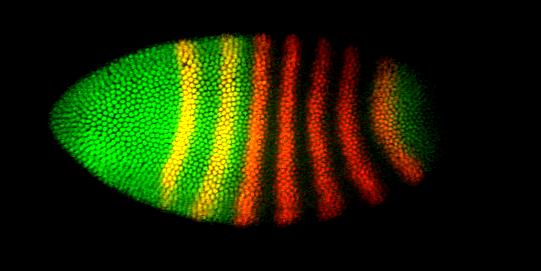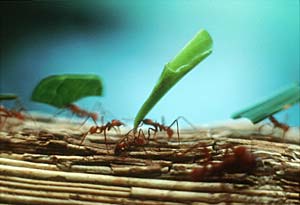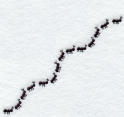DIVISION OF ENGINEERING AND APPLIED SCIENCES
HARVARD UNIVERSITY
CS 266: Biologically-inspired Distributed and Multi-agent SystemsFall 2004 |



| Course Description |
Instructor: Prof. Radhika Nagpal
Lectures (Fall 2004): Tuesday/Thursdays 10:00-11:30
Location: TBA
Office Hours: TBA
A colony of cells cooperates to form a multicellular organism under the direction of a common genetic program. A swarm of bees cooperates to construct a hive. Emerging technologies are making possible a new class of large-scale, embedded, distributed systems --- from vast sensors networks for habitat monitoring and smart buildings, to smart materials with embedded sensors and actuators, to swarms of tiny robots and shape-changing robots with thousands of modules, to even harnessing biological cells as new computational substrates. These examples raise a fundamental question for the organization and design of computing systems: How do we engineer robust behavior from the cooperation of vast numbers of unreliable parts? Biology hints that there may be significant power to be achieved from building things out of cheap, imprecise parts with limited life.
This class will survey the state of the art in biologically-inspired approaches to designing robust collective behavior, in diverse domains. A unifying theme amongst these domains is the desire to construct robust systems consisting of many individually unreliable nodes, that give complex but predictable global behavior. We will focus on algorithms, methods for analysis, and programming paradigms for engineering self-organizing systems. Topics include: swarm behaviors and robotics, amorphous computing and smart materials, reconfigurable robotics, immune-inspired systems, synthetic biology. The class will be primarily based on discussions of research papers, along with a research project.
This class is geared toward graduate students at all levels as well as advanced undergraduates (CS 161 or CS 143 is required).
| Assignments |
This course will involve reading research papers, leading and participating in class discussions, and completing a research project.
Student will write a short review for each paper assigned that week. Reviews are due before each class by email.
Students will also be expected to lead the class discussion in at least one lecture. There will be time set aside to come discuss your lecture plan with me.
Finally, students will undertake a major research project of their choice, either individually or small groups. Proposals will be due at the end of the first month. There will be several suggested projects, however students are encouraged to pick a general area that interests them and formulate a research project within that area. At the end of the course, students will present their work to the class in a short talk. The goal is to gain experience in research and to produce a result that might lead to a publishable paper in the future.
More details on each of these aspects will be presented at the first class.
| Syllabus and Schedule |
Tentative Schedule:
week 1: Introduction
week 2: Swarms: models of flocking, foraging, stigmergy
week 3: Swarms: robotics, languages, applications
week 4: Amorphous Computing: models of developmental biology, morphogensis
week 5: Amorphous Computing: programmable self-assembly, paintable computing
week 6: Proposal presentations
week 7: Reconfigurable modular robots
week 8: Sensor networks and pervasive computing
week 9: Immune system: models
week 10: Immune system: applications
week 11: Synthetic Biology: biological substrates
week 12: Synthetic Biology: programming paradigms
week 13: Project presentations
| Contact Info |
Radhika Nagpal
rad at eecs.harvard.edu
Office: 235 Maxwell Dworkin